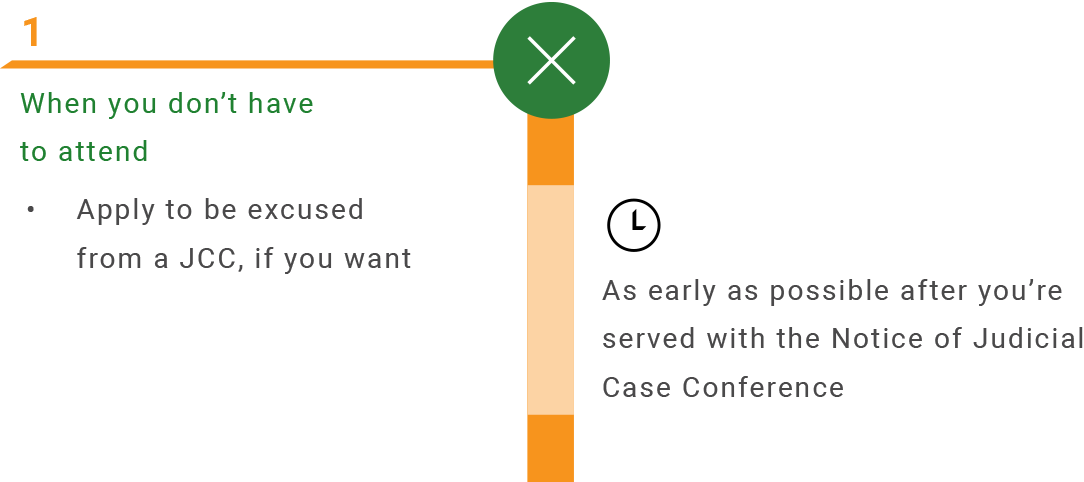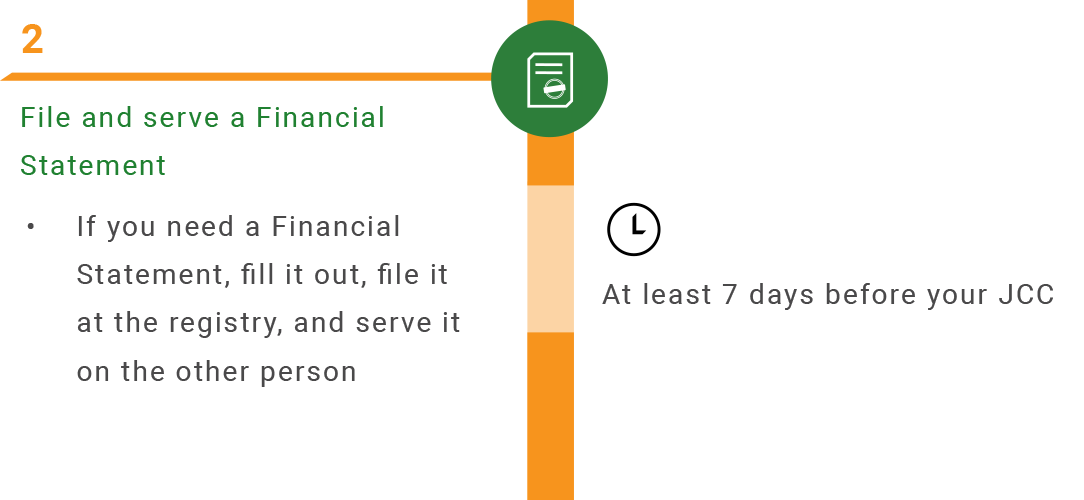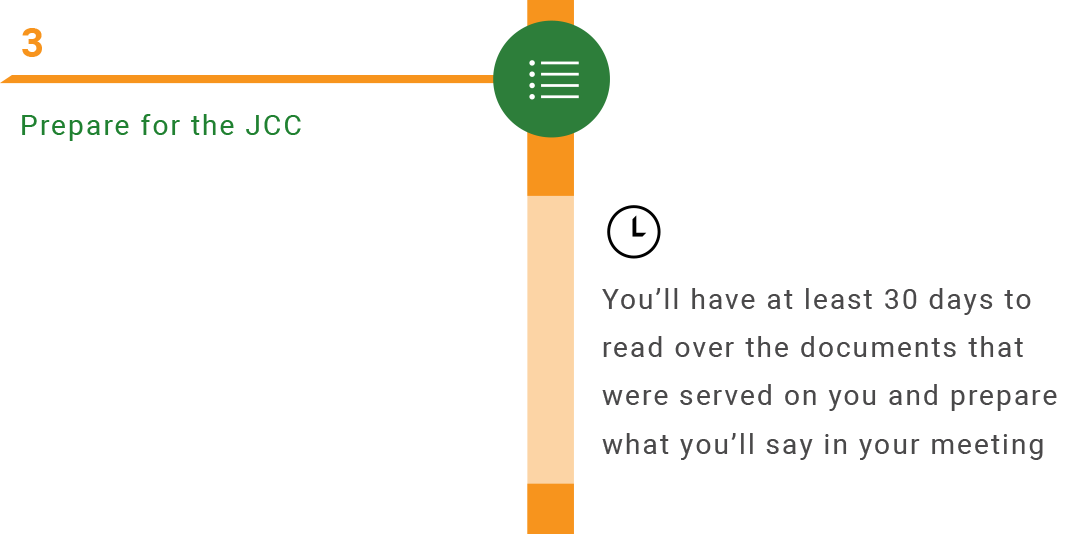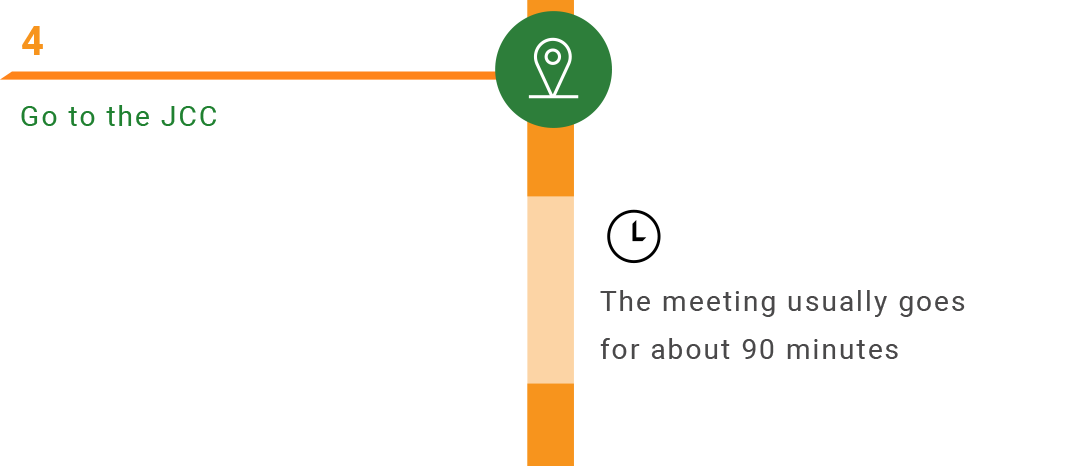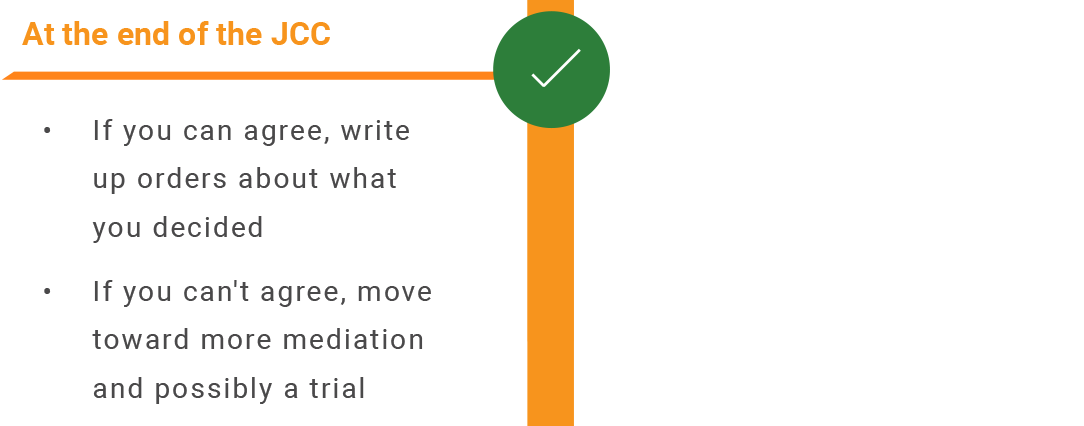Introduction
This step-by-step guide is for you if you’ve been served with a Notice of Judicial Case Conference.
What's a JCC?
A JCC is a confidential meeting between you, the other person involved in your case (for example, your ex-spouse), your lawyers if you have them, and a judge or master. It gives you and the other person a chance to work things out without having to go to court.
A JCC isn't required if having it could be dangerous or unfair, or if it's too soon or too late to resolve your issues. You can apply to be excused from having a JCC in the next step.
How long does the process take?
The JCC process will take at least one to two months, but could take several more if your Supreme Court registry is busy.
A JCC can help to avoid or reduce the hard feelings that can arise when you have to go to court.
When you don't have to attend
You’ll need
- Requisition general(application) (Form F18.1), if you want to apply to be excused from having a JCC
When a JCC isn't required
If the other person serves you with a Notice of Judicial Case Conference (Form F19), you must go to the JCC at the date and time written on the notice, or apply to be excused.
You can apply to the court to be excused from having a JCC if:
- your matter needs to be resolved quickly;
- it's too soon to have a JCC;
- it would be unfair, inappropriate, or unmanageable to have a JCC;
- it could be dangerous to your health or safety to delay your application or to require a JCC; or
- the judge or master decides it's right to excuse you.
If you don't qualify to be excused from the process, continue to the next step to prepare your documents for the JCC.
How to apply to be excused from a JCC
To apply to be excused from the JCC:
- Fill out the Requisition (Form F18.1).
- Attach a letter from you or your lawyer that states the reasons why you want to be excused.
- File your completed Requisition and your attached letter at the registry where the Notice of Family Claim (Form F3) was filed.
The court considers your request
The registry will give your documents to a judge or master, and they'll consider your request. The judge or master can:
- require you to file documents with more information,
- require that you or your lawyer go to court to give more information about your application,
- make the order you asked for,
- refuse to make the order, or
- make any other order.
The registry staff will let you know what the judge or master decides. While you wait for the decision, you might not have to attend court.
Quick links
Remember that while it might be stressful, settling your issues now will make things easier in the long term.
File and serve a Financial Statement
You'll need
- Your completed Financial Statement (Form F8) and attachments, if required
- The other person's address for service
You might need to file and serve a Financial Statement (Form F8) and related documents before your Judicial Case Conference (JCC). A Financial Statement tells the judge or master about your:
- income,
- expenses,
- assets, and
- debts.
If you don't need to complete a Financial Statement, skip to the next step.
File your Financial Statement
At least seven days before the JCC, file your Financial Statement and any attachments at the same Supreme Court registry where your JCC will be held.
Serve your Financial Statement by ordinary service
You can serve your Financial Statement and any attachments by ordinary service. This means that the documents can be:
- dropped off at a business or residential address,
- sent by regular mail,
- faxed with a Fax Cover Sheet (Form F95), or
- emailed.
Which method should you use?
The method you use will depend on the type of information the other person listed in their address for service on their own court documents. You can only serve a document to an address they've listed.
It might also depend on how much time you have until your scheduled JCC. The other person must receive the documents at least 30 days before your JCC, and some methods take longer than others.
Getting enough sleep can help you work through stressful times.
Prepare for the JCC
To prepare for the Judicial Case Conference (JCC), read the Litigants' Guide to Judicial Case Conferences and the Case Management Plan. These documents should have been served on you with the Notice of Judicial Case Conference.
The Litigants' Guide describes in detail what happens at the JCC and will help prepare you for what to expect. The Case Management Plan is a form that the judge or master will use to identify the issues of the case and fill out at the end of the JCC.
Being prepared ensures that your side of the story is heard and considered. You can do this.
Go to the JCC
You'll need
- Your Financial Statement and attachments, if required
- Your sworn Affidavit of Ordinary Service
- Any documents the other person served on you (for example, their Financial Statement), if any
- A copy of the Litigants' Guide to Judicial Case Conferences
- A blank copy of the Case Management Plan
At the courthouse
The Judicial Case Conference (JCC) meeting will take about 90 minutes and will be held at the courthouse where the Notice of Family Claim (Form F3) was filed. The JCC will take place either in a courtroom or in a meeting room.
Make sure to bring all the forms and documents in the list above.
When you arrive, check the bulletin board at the courthouse, or ask registry staff for help finding the correct room. Arrive early so you're relaxed and ready to begin at the scheduled time.
What you'll discuss
The judge or master will begin by asking each of you what you think the issues are. Refer to your Litigants' Guide to Judicial Case Conferences and Case Management Plan when giving your answers.
Together with the judge or master, you and the other person will review different ways to resolve the issues you can't agree on. If you have any questions about ways to resolve the issues, this is your chance to ask.
Depending on your circumstances, the discussion might focus on how to settle your case or on how to manage the case.
Be prepared to share information
You might also discuss processes for moving your case along, such as financial disclosure. The judge or master can make orders and directions to make sure both of you complete these steps.
Managing your case often involves making sure you both have the information you need to have a meaningful settlement discussion. This information is generally the same information you'll need to present in court if the case isn't settled at the JCC.
If you haven't already exchanged financial statements, the judge or master might order them to be exchanged within a certain time. They might even order both of you to attend another JCC once that has happened.
It can be difficult coming face-to-face with the other person. Refer to your documents if you need to, answer questions as best you can, and keep to the facts that you know to be true.
At the end of the JCC
Next steps
Expand the heading that fits your situation to find out what to do after your Judicial Case Conference (JCC).
You've now gone through all the steps required to prepare for and attend a Judicial Case Conference in Supreme Court.
Thank you for using our step-by-step guide.

